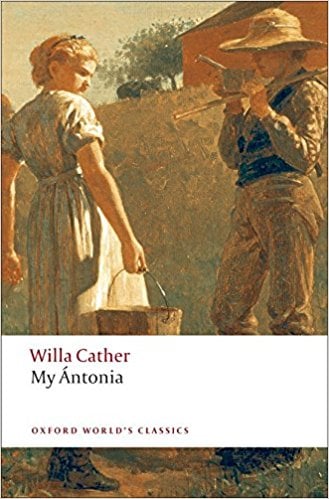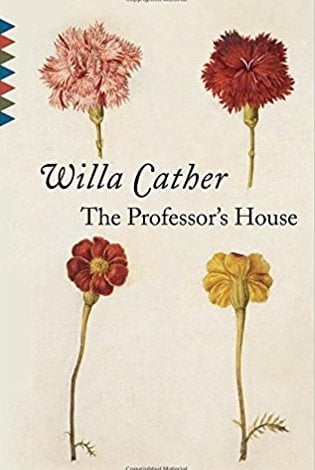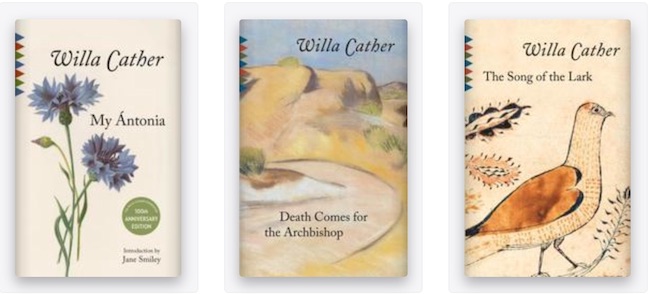A Lost Lady by Willa Cather (1923)
By Nava Atlas | On February 27, 2019 | Updated January 22, 2023 | Comments (0)

A Lost Lady (1923) is a shining example of Willa Cather’s gift for concise expression and talent for vivid character studies. Marian Forrester, a young woman of beauty and grace, brings an uncommon air of sophistication to the frontier town of Sweet Water.
Marian wound up in Sweet Water, which lay along the Transcontinental Railroad, through her marriage to the much older Captain Daniel Forrester.
The novel is written from the viewpoint of Niel Herbert, a young man who has grown up in Sweet Water. He idealizes Mrs. Forrester, even as he witnesses her decline. As a contemporary edition of A Lost Lady concludes, “The recurrent conflict in Cather’s work, between frontier culture and an encroaching commercialism, is nowhere more powerfully articulated.”
A Lost Lady came out on the heels of One of Ours (1922), which, even though it disappointed critics for the most part, nevertheless won the Pulitzer Prize.
A Lost Lady mitigated the disappointment of One of Ours, restoring her to her well-earned place in the American literary canon. It’s always fascinating to read reviews of novels that have achieved the status of a classic from when they first came out. Following are two reviews that appeared in 1923.
. . . . . . . . . .

. . . . . . . . . .
A Lost Lady: Portrait of Marian Forrester
From the Detroit Free Press, October 14, 1923: To be sure, Willa Cather disappointed most of her admirers in One of Ours (1922), but to read My Antonia is to engrave Willa Cather’s with the names that endure.
O Pioneers! has the same breadth and power, the same grasp of the pioneer theme, the same engaging simplicity, but it hasn’t the added interest of centering vividly around one character.
The setting for A Lost Lady is once again the raw west, though the date is later than in the earlier novels — after the railroads had gone through and the railroad aristocracy had developed, “men who had to do with the railroad itself, or with one of the land companies which were its by-products.
Miss Cather’s story centers on the Forrester home, which was one of those always open to officers of the road and their families traveling east and west through Sweet Water. Without these visitors, indeed, this side-tracked little village would have been desolate and dull enough:
“The house stood on a low round hill, nearly a mile from town; a white house with a wing, and sharp-sloping roofs to shed the snow. It was encircled by porches, too narrow for modern notions of comfort, supported by the fussy, fragile pillars of that time, when every honest stick of timber was tortured by the turning-lathe into something hideous.”
. . . . . . . . . .

See also: My Antonia by Willa Cather
. . . . . . . . . .
The story is incidental to the character of Marian Forrester, Captain Forrester’s young wife about whom the life of the house centered. Miss Cather’s ability in character revelation is amazing. In the simplest, most straightforward way, she tells you exactly what a person is like. Marian Forrester is charming, feminine, and potent.
To the town, she is a symbol of the elegance of a civilization vaguely felt to exist somewhere east of Sweet Water. To young Niel Herbert she represents all that is desirable in the outside world. Like Antonia, Marian Forrester will live vividly for you long after you have forgotten the details of her life.
You imagine for a time as you proceed with the story that Miss Cather is portraying the disintegration of character — another writer might have fallen into that error with Marian Forrester.
Miss Cather has done a subtler, wiser thing in simply revealing strength and weakness as they are inextricably interwoven in the character of a lovely woman who prefers the fine to the vulgar, but who, left with “only the stage hands to listen,” draws them in to the charmed circle of her need.
She gives, with all her supports about her — influential husband, money — “the sense of tempered steel, a bade that could fence with anyone and never break.” When these supports are removed, it is evident that she has assailable points that her strength was drawn from without as well as from within.
The Captain understood his wife better than she understood herself; and understanding her, he, in his own phrase, “valued her.”
It is only to Niel Herbert, from whose viewpoint the story is mostly told, that Marian Forrester is a … “lost lady. Beautiful women, whose beauty meant more than it said . . . was their brilliancy always fed by something coarse and concealed? Was that their secret?”
. . . . . . . . . .

7 Later Novels by Willa Cather
. . . . . . . . . .
A Lost Lady: An unforgettable woman
From the Honolulu Star Bulletin, October 13, 1923: Miss Cather is primarily honest, and honesty means fearlessness. She is never so blinded by the compassion or proprietary pride to minimize in any way the faults of her characters, or to try to hide an unpleasant trait behind a virtue. Marian Forrester, the seductively charming heroine, is at times shown up in spotlights which reveal anything but beauty and nobility.
The book is primarily a character analysis of this strangely fascinating woman, the young and beautiful wife of an old railroad contractor living in the days that followed the extravagant period of development of the West.
There is a certain pathos in the story of Marian’s life. First, because she is tied down to a very much older man; again because, being surrounded by only the simple villagers, who must inevitably wear badly cut clothes, knobby toes on their toes on their shoes out of the room, she is isolated in her beauty and sophistication; and lastly, because she is pictured throughout through the wistful eyes of a youth, very much younger than herself, whose adoration lent her the asset of mystery and yet who understood her too well not to be sickened by her disintegration.
Marian was bewitching to the end, never admitting defeat until she was bowled over by it. She was an unforgettable sort of person, and in later years, after she passed out of his life, Niel Herbert was glad to have known her.
. . . . . . . . . .
 . . . . . . . . . .
. . . . . . . . . .
Leave a Reply